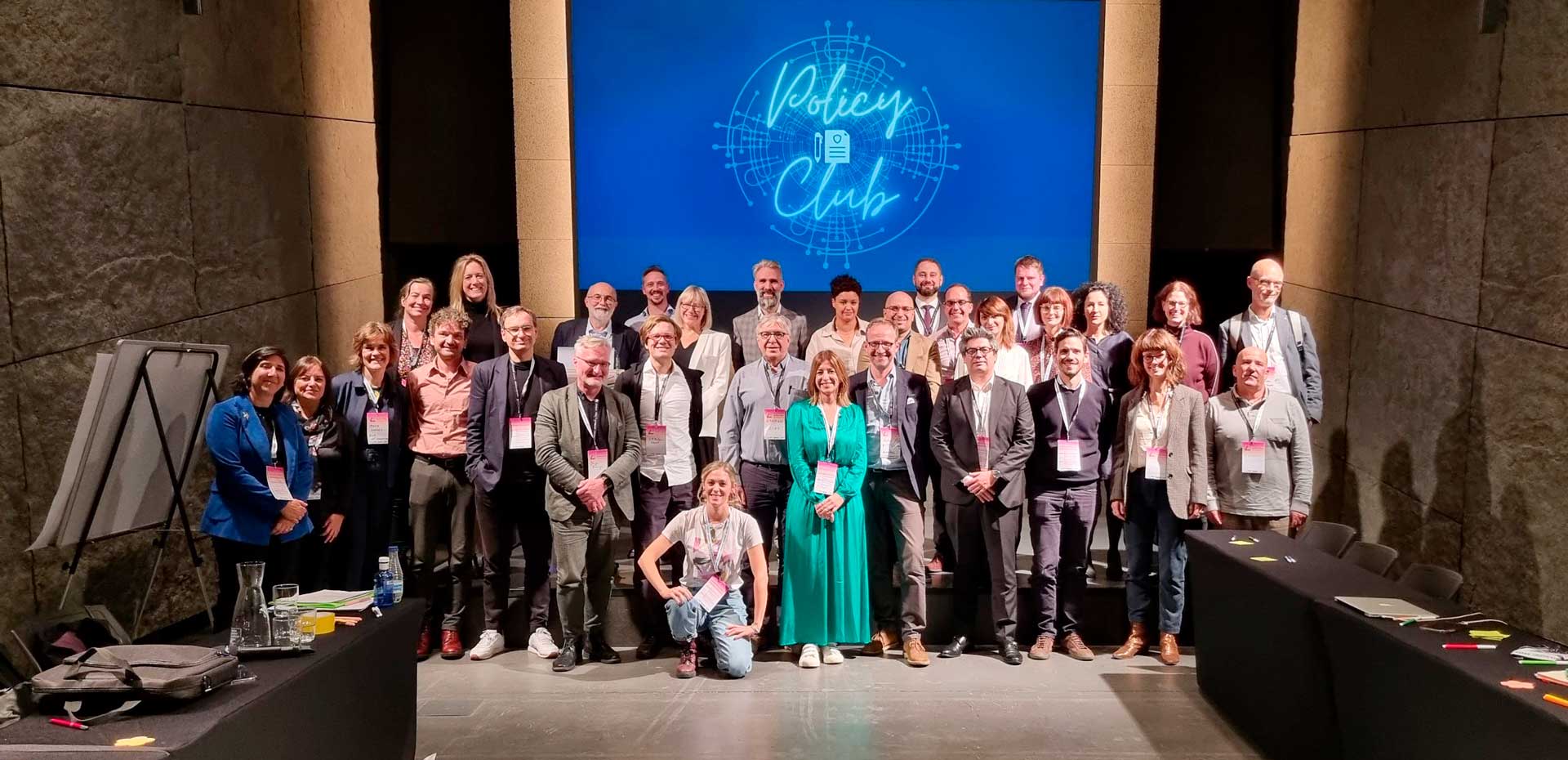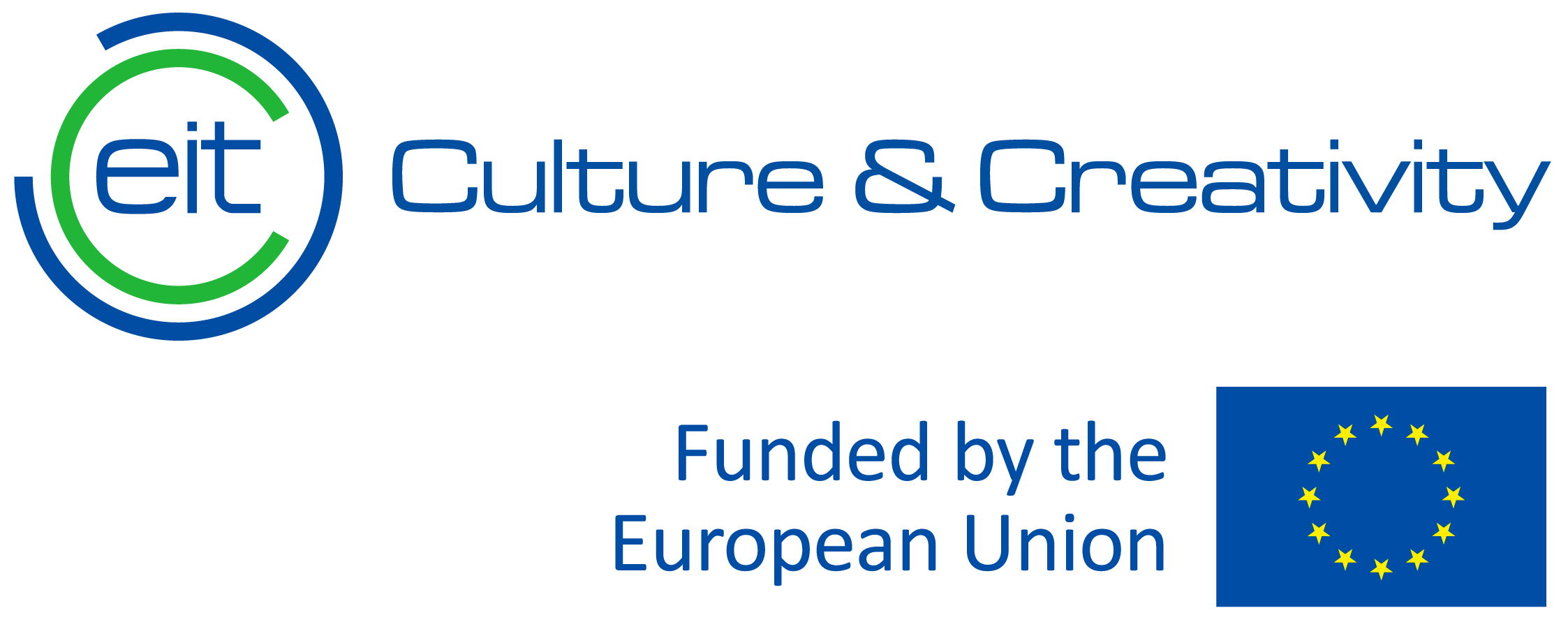On October 27th, EIT Culture & Creativity participated in the #ECIS23_Bilbao to commemorate the first meeting of delegates within its dedicated network for policymakers. Following an engaging program with the theme “Decolonising Innovation – Decolonising the Mind,” and featuring several inspirational opening speeches, including one by MEP Dr. Christian Ehler, the afternoon was dedicated to co-creation workshops conducted by and for the EIT Culture & Creativity’s Policy Club, focusing mainly on the group’s governance, shared objectives and operational methods. As a result of these deliberations, a decision emerged to rename the Policy Club as the Cities & Regions Network.
Held at Azkuna Zentroa in Bilbao, these workshops were split into two sessions and were overseen by CNR ISPC research fellow Maria Tartari under the guidance of Pier Luigi Sacco. The workshops brought together 28 delegates from different parts of Europe to discuss the future direction of cultural and creative sectors in Europe, hereby taking a crucial initial step towards laying a solid foundation for the Cities & Regions Network. The discussions held during the workshops underscored the significance of culture, the necessity for well-defined objectives, and the value of collaboration with various sectors and stakeholders. As the Cities & Regions Network evolves, it is set to play a pivotal role in shaping the future of cultural and creative policies in Europe.

In the initial workshop session, the delegates were tasked with operating as a collective intelligence, utilising a digital fine-tuning tool. This tool facilitated the initiation of a peer learning process and the exchange of insights concerning the group’s objectives, its organisational structure, and collaborative policy process design.
In the second session, the delegates engaged in spirited dialogues concerning the role of culture, its impact on policy, the need for clear objectives, and the necessity for cross-sector collaboration. The discussion also centered on selecting a name for the club that would properly reflect its essence. Participants aimed to refine the terminology and enhance comprehension of the club’s mission. Furthermore, A lively discussion took place regarding the importance of community-centric policies that engage citizens and lend legitimacy to cultural policies. Notably, participants recognized the significance of engaging young people and increasing diversity.
The debates held during the workshop also underscored the intrinsic value of culture itself, cautioning against instrumentalizing culture for other purposes, regardless of their importance. Furthermore, the entire workshop emphasized the need to reform the industrial business model to recognize the contributions of SMEs, thus ensuring inclusivity in the cultural and creative sectors.
We thank all delegates for their input, ideas and work.
A full list of current delegates and ambassadors of the EIT Culture & Creativity Cities & Regions Network (former Policy Club) can be found below:
- Aitziber Atorrasagasti Calcedo, Basque Government
- Anita Debaere, Pearle*-Live Performance Europe
- Araf Ahmadali, City of Amsterdam
- Bruno Inácio, Municipality of Faro
- Carlos Moedas, Municipality of Lisboa
- Carsten Brosda, Municipality of Hamburg
- Charles Landry, Creative Bureaucracy Festival
- Chiara Colangelo, Regione Abruzzo, Dipartimento Presidenza
- Cinzia Lagioia, Creative Puglia Cluster, Apulia region
- Cristina Ortega Nuere, World Leisure Organisation
- Daniel Martínez Rodríguez, City of Madrid
- Dr. Stella Donata Haag, Filmuniversiät Babelsberg
- Elke Timmerman, Flanders DC
- Ernest Slot, Ministerie van Onderwijs, Cultuur en Wetenschap
- Evdokimos Konstantinidis, ENOLL
- Gerbrand Bas, Federatie Creatieve Industrie
- Gerin Trautenberger, Kreativwirtschaft Austria
- Helen Smith, Impala Music
- Jan Bormans, European Startup Network
- Jan Pekař, Deputy Mayor, City of Český Těšín
- Janet Ågren, Municipality of Umeå
- Jari-Pekka Kaleva, European Games Developer Federation (EGDF)
- Jarosław Czuba, Ministry of Culture, Poland
- Jessica Fuller, Western Development Commission
- Jokin Garatea, Municipality of Forua, Spain
- Julie Hervé, Eurocities Network
- Jürgen K. Enninger, Municipality of Augsburg
- Jutta Scheibelberger, Wirtschaftsagentur Wien/ Vienna Business Agency
- Krista Petajajarvi, The Northern Dimension Partnership on Culture, Municipal council of Kirkkonummi, Helsinki metropolitan area
- Kristian Horsburgh, Creative Industry Cluster by Luxinnovation
- Lars Ebert, Culture Action Europe
- Laure Kaltenbach, Creative Tech
- Lourenco Jardim, City of Lisboa
- Lucia De Siervo, Municipality of Emilia-Romagna Region
- Marcel Gibóda, City of Kosice
- Maria Hansen, ELIA Artschools
- Maria J. del Blanco, Bilbao Ekintza
- Martijn van der Mark & Idelette Rocha, City of Rotterdam
- Mirijam Boehme, City of Aachen
- Mustafa Gül, Istanbul Bilgi University
- Pier Luigi Sacco, University of Chieti-Pescara
- Robert Piaskowski & Carlos Panek Soares de Araujo, City of Krakow
- Scott Lipinski, European Fashion Alliance
- Simone Dudt, European Music Council
- Stefan Gies, AEC Music
- Tommaso Sacchi, City of Milano
- Urmas Klaas, Municipality of Tartu
- Yann Galut, Maire de Bourges
- Yordanka Fandakova, Municipality of Sofia
- Zarja Vintar, Kofein dizajn
- Zora Jaurová, City of Bratislava
Piece written by Lisa Reitinger with the support of Maria Tartari.

About EIT Culture & Creativity
EIT Culture & Creativity is the ninth Innovation Community by the European Institute of Innovation and Technfology (EIT), a body of the European Union. It is designed to strengthen and transform Europe’s Cultural and Creative Sectors and Industries (CCSI) by connecting creatives and organisations to Europe’s largest innovation network. It takes a holistic and open approach to innovation – from tech to artistic driven innovations, from business to citizen driven – and reinforces the appreciation and anchoring of European values and identities. EIT Culture & Creativity will unlock latent value from a multitude of small CCSI stakeholders through technology transfer, improved cross-sectoral collaboration and their effective integration in production value networks. EIT Culture & Creativity will support technology and business innovation; artistic innovation and social innovation. It will also harness the unique position of the CCSI to facilitate the Triple Transitions in Europe – green, digital and social.
About The European Institute of Innovation and Technology (EIT)
The EIT is Europe’s largest innovation ecosystem bringing together close to 3,000 partners from top business, research and education organisations across Europe in over 80 innovation hubs. The EIT strengthens Europe’s ability to innovate by powering solutions to pressing global challenges and by nurturing entrepreneurial talent to create sustainable growth and skilled jobs in Europe. The EIT is an EU body and an integral part of Horizon Europe, the EU Framework Programme for Research and Innovation. The Institute supports dynamic pan-European partnerships, EIT Knowledge and Innovation Communities, composed of leading companies, research labs and universities each dedicated to solving a pressing global challenge, from climate change to health, to renewable energy.



